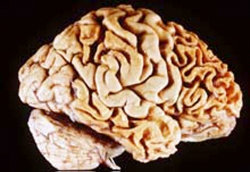Frontotemporal dementia
Frontotemporal dementia (FTD) is one of three clinical syndromes associated with frontotemporal lobar degeneration. FTD selectively affects the frontal lobe of the brain and may extend backward to the temporal lobe. There are two main types: Pick's disease, which has been recognised for many years, and Dementia of the Frontal Lobe Type (DFLT), more recently described. The pathology of these two conditions is different although the clinical manifestations are similar. more...
The frontal lobe is involved in many aspects of mental function. These include motivation and drive, classifying and categorizing, emotion and personality. Social behaviour is also influenced as is appetite.
Frontal dysfunction may therefore lead to apathy or conversely disinhibition, disordered high level thinking- perseveration, and personality change. The manifestation will depend on which part of the lobe is more affected — dorsolateral or orbitomedial. Many routine dementia assessments do not test the frontal lobe.
Frontotemporal dementia sometimes occurs with Motor neurone disease.
Further reading
- A collection of articles about Frontotemporal dementia in the journal Neurology
- Radin, Lisa. "What If It's Not Alzheimer's: A Caregiver's Guide to Dementia." Prometheus Books. 2003.
Read more at Wikipedia.org



